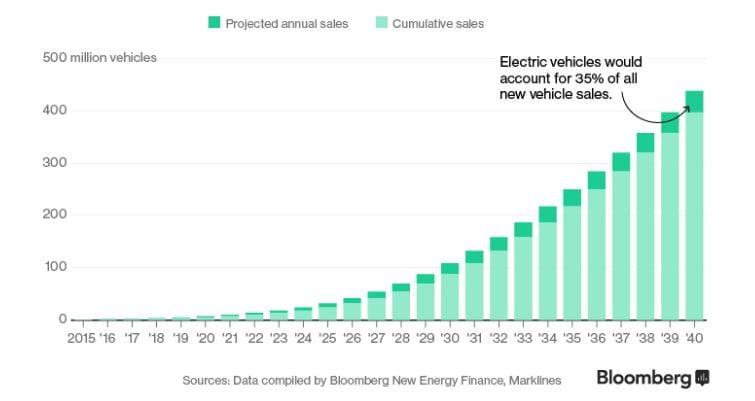Electric cars vs conventional cars
Battery prices fell 35% last year and at this pace, the cost of an electric car should be comparable to the cost of the gas-powered car by 2020. Bloomberg states that by 2040, long-range electric cars will cost less than $22,000 in today’s dollars.
By 2040, electric vehicles could account for 35% of all new vehicle sales
How to Play electric cars trend
You can invest in Battery makers and the makers of electric cars; the most famous of these is TSLA (Tesla motors). However, we suspect there will be a lot of competition in this field soon and the price of these vehicles could plummet a lot faster than projected. In terms of TSLA, we would use strong pullbacks to open positions, other car makers such as Nissan and Toyota merit attention too. In terms of battery manufacturers, NIPNF (NEC Corp) and Panasonic Corp (PCRFY) are two companies you could take a closer look at.
However, just for the record, we think the electric car trend is being over-hyped. We feel that there are still better and more efficient technologies waiting to be deployed and or discovered.
Debunking the hype of Electric cars
Several companies that offer electric cars praise their lower operational cost. A typical calculation goes like this:
Your present car needs 10 litres of gasoline to go 100 kilometres. At 1.3 Euro per litre, that makes 13 cents per kilometre. Our super-duper electrical car needs only 15 kWh of electricity for those 100 kilometres. At 8 cents per kWh (night-time rate), that’s only 1.2 cents per kilometre! Look how much money you will be saving!
The calculation in itself might be correct, but it colours some facts, and completely omits other, very important ones! For starters, the 10 litres per 100 kilometres stated there are valid for a large, heavy car, which can take five passengers and a significant amount of load, has air conditioning, and is being driven fast. The 15kWh per 100 kilometres instead is for a tiny minimal electric car that seats two people, with no cargo, and goes at half the speed of the gasoline car. Talk about comparing apples to oranges.
Will you come home in your electric car, park it, then wait until midnight or whenever the electricity rate drops (if it does at all!), and then plug it in? Most people won’t have the discipline to do that, nor the technical inclination to use a timer, even if the latter is easy to do. Also, there will be many cases when you will be forced to recharge your car during the day, at high electricity cost. So the 8 cents per kWh might turn into 20 or more.
But electricity is not nearly the most important factor in operational cost!
What the electric car manufacturers try to hide from the clients is the huge operational cost caused by battery replacement! Unfortunately, the batteries don’t last very long, and they are expensive. A typical lead-acid battery used for an electric car might store 1kWh for 200 times before its lifetime is over, and might cost 80 Euro. You need several of those batteries for a small electric car, of course. Anyway, with 80 Euro worth of battery storing a total of 200kWh over its lifetime, you have 40 cents per kWh of stored energy, in battery replacement cost alone!!! So, the battery replacement cost for a tiny electric car is about the same as the gasoline cost for a big conventional car! How’s that for an important fact hidden by the seller?
And that’s considering lead-acid batteries, which are the least expensive of all available options! They are heavy, use nasty sulfuric acid, and so some electric car makers are tempted to use better battery technology, such as one of several nickel chemistries, or even lithium. Nickel lasts longer than lead, lithium lasts about the same or less than lead, but both are more expensive than lead. As a result, nickel batteries cost more per kWh stored over their lifetime, and lithium batteries cost very much more!
So, the very simple fact is that for an electric car, battery replacement cost alone is higher than the entire operational cost of a similarly sized gasoline car!
It comes as a minor, insignificant addition that the electric car makers don’t mention the losses due to charge efficiency of a battery not being 100%. The battery needs more charge (ampere-hours) put into it, then it will give back, and it needs to be charged at a higher voltage than what it will give back. The two things compound to make a battery about 70 to 80% efficient, at most. Also, the chargers have some losses, even if these are small. As a result, if the manufacturer states that his car will go 100 km with a charge of 15kWh in the batteries, you will need to buy about 20kWh of electricity to recharge the car after that. Full Story
Electric Cars as an example of a market failure
Behind this so-called stellar growth in the electric cars, market was something called subsidies.
Who benefits most from subsidies? A Manhattan Institute report on EVs highlights the fact that more than 50% of EV buyers in the United States lived in households with an annual income of at least $100,000, and 20% had yearly incomes over $200,000. The conclusion is that subsidies come at the expense of lower-income drivers of gasoline-powered cars who cannot really afford to buy any new vehicle, much less an electric one. It is they who end up paying for highway maintenance costs through fuel taxes.
Also, as more electric vehicles hit the streets, electricity replaces fuel consumption. The International Energy Agency estimates that by 2030, electricity could displace about 4,8 million barrels of petrol and diesel used per day. This could result in a revenue loss of close to $100 billion in fuel taxes, a major source of financing infrastructure development. Thus, governments need to find alternative taxation income and someone needs to bear this cost. Full Story
Electric Vehicles; the Dirty Secret
Electric cars have higher manufacturing emissions than normal cars. Electric cars also use electricity that has its own footprint. And put together these two factors are a ‘dirty little secret‘ that negate any climate benefit of electric cars!
Electric cars have higher manufacturing emissions than normal cars. Electric cars also use electricity that has its own footprint. And put together these two factors are a ‘dirty little secret‘ that negate any climate benefit of electric cars!
In our recent study ‘Shades of Green: Electric Cars’ Carbon Emissions Around the Globe‘ we calculated grid powered electric car emissions in twenty countries. But we actually had data for quite a few more countries we didn’t include. Full Story
Other articles of Interest
Global Warming Hoax destroyed by Nobel Laureate (March 22)
Looting Made Easy; Corporate Share buybacks Keeping Dow Bull Alive (March 19)
Foreign Governments Dumping Record Amount of US debt (March 18)
US Congress losing mind over Russian Arms Sales to Iran (March 17)
Russian economy improving; Inflation down over 50% (March 17)




